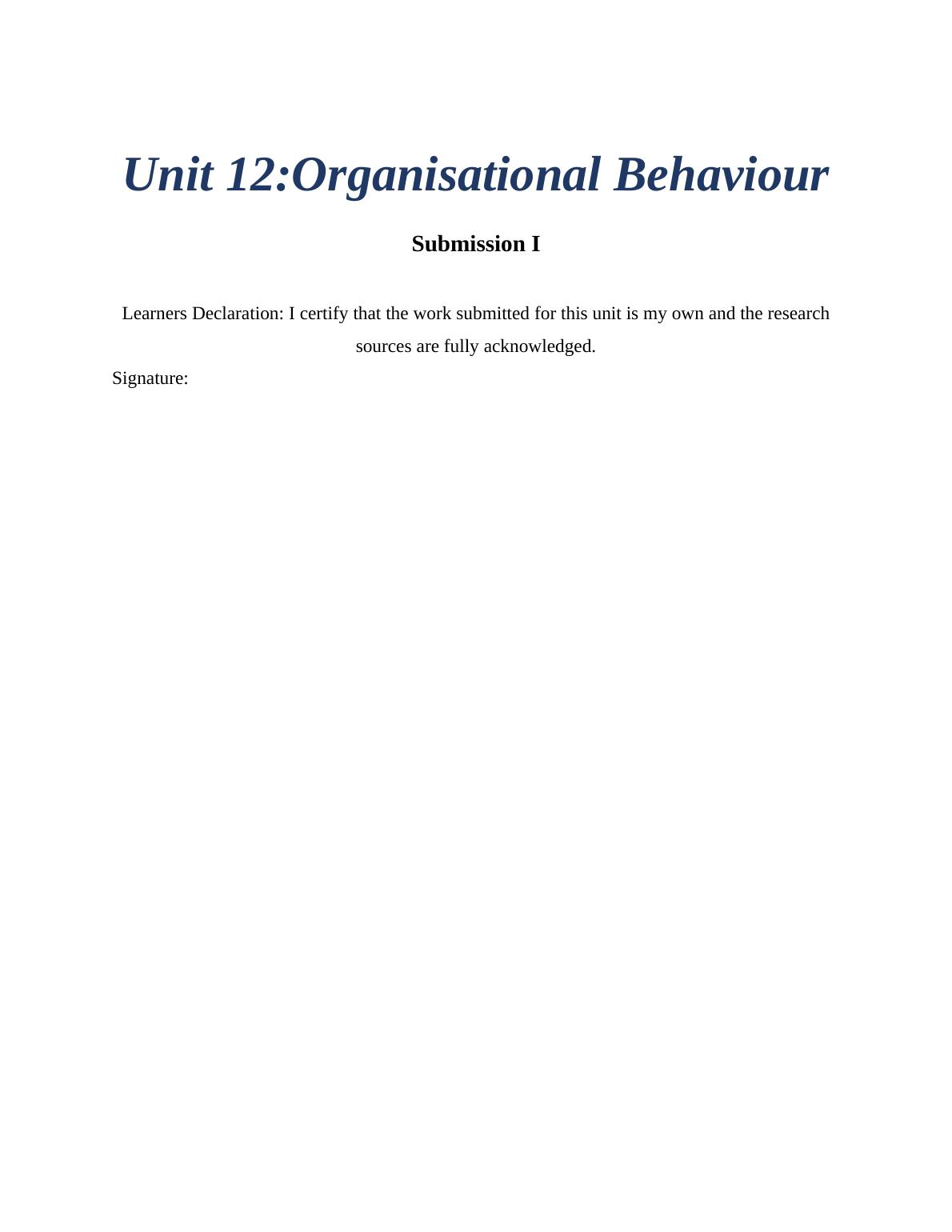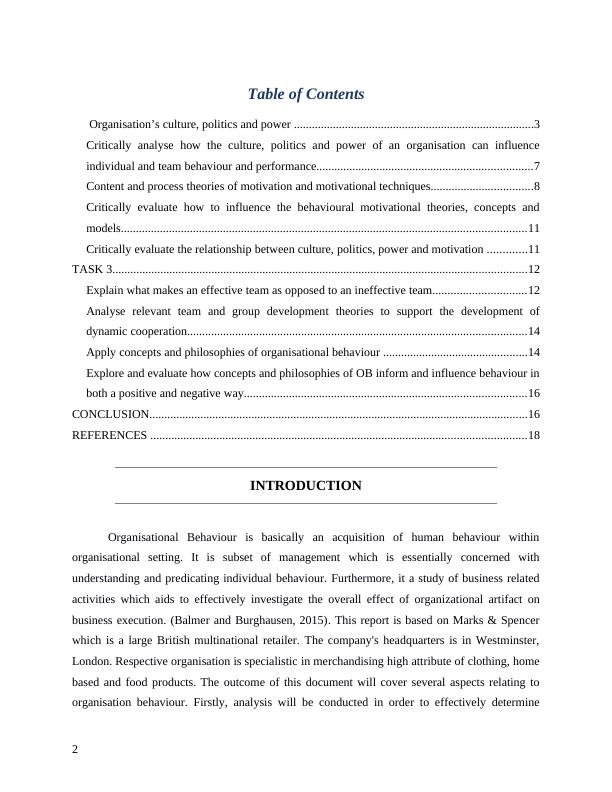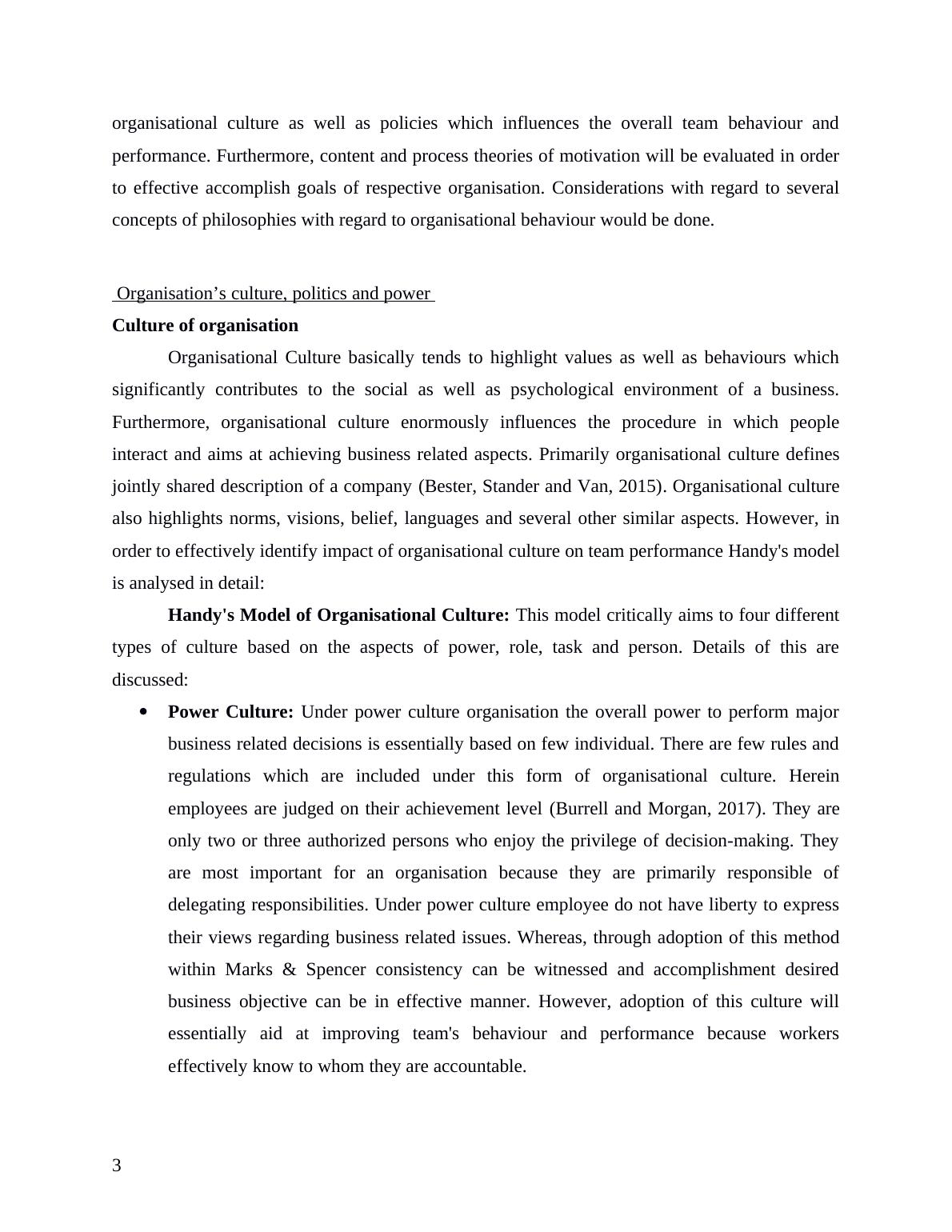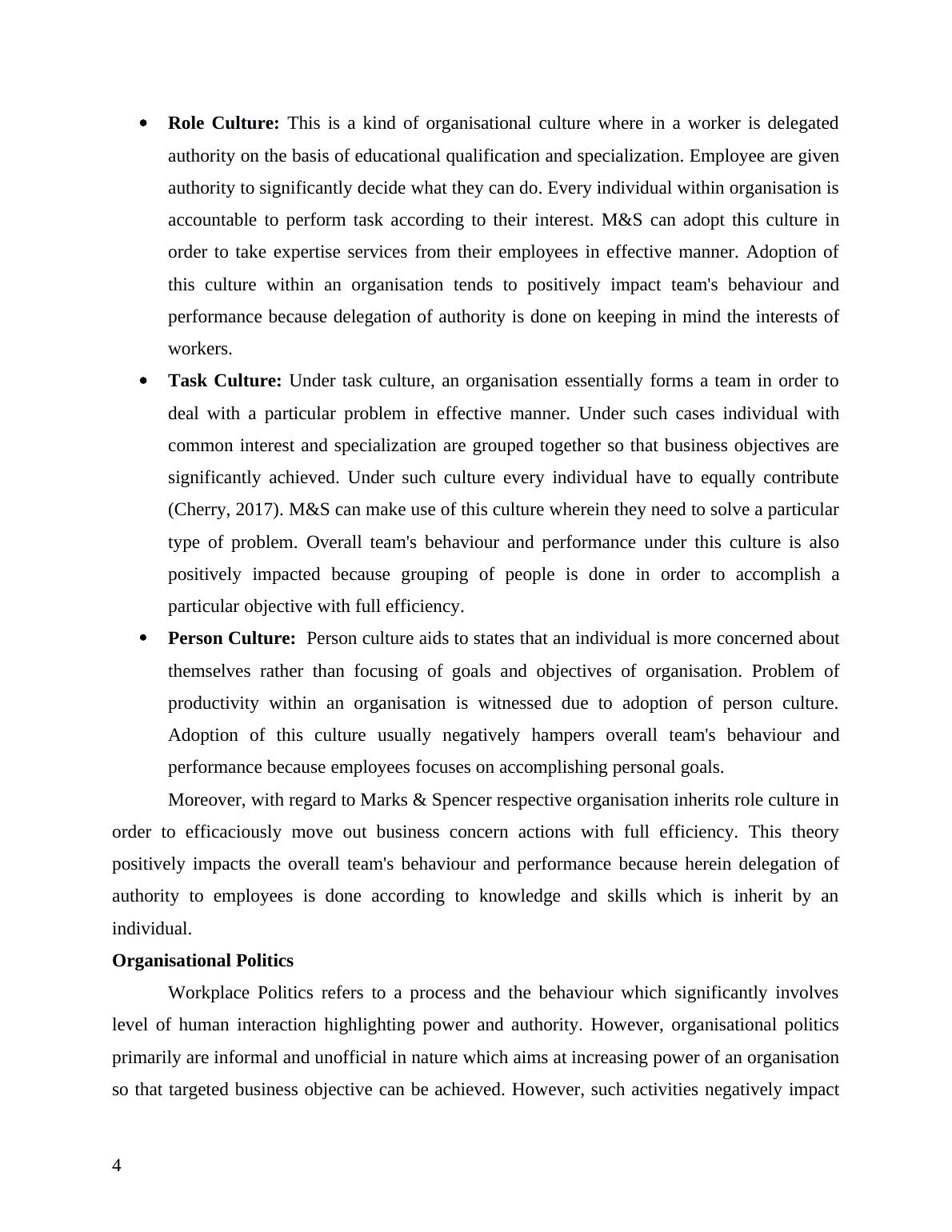Organisational Behaviour: Culture, Politics and Power
19 Pages6659 Words79 Views
Added on 2023-01-19
About This Document
This document explores the impact of organisational culture, politics, and power on individual and team behaviour and performance. It discusses various theories of motivation and provides insights into motivational techniques. The case study focuses on Marks & Spencer, a British multinational retailer.
Organisational Behaviour: Culture, Politics and Power
Added on 2023-01-19
ShareRelated Documents
Unit 12:Organisational Behaviour
Submission I
Learners Declaration: I certify that the work submitted for this unit is my own and the research
sources are fully acknowledged.
Signature:
Submission I
Learners Declaration: I certify that the work submitted for this unit is my own and the research
sources are fully acknowledged.
Signature:

Table of Contents
Organisation’s culture, politics and power ................................................................................3
Critically analyse how the culture, politics and power of an organisation can influence
individual and team behaviour and performance........................................................................7
Content and process theories of motivation and motivational techniques..................................8
Critically evaluate how to influence the behavioural motivational theories, concepts and
models.......................................................................................................................................11
Critically evaluate the relationship between culture, politics, power and motivation .............11
TASK 3..........................................................................................................................................12
Explain what makes an effective team as opposed to an ineffective team...............................12
Analyse relevant team and group development theories to support the development of
dynamic cooperation.................................................................................................................14
Apply concepts and philosophies of organisational behaviour ................................................14
Explore and evaluate how concepts and philosophies of OB inform and influence behaviour in
both a positive and negative way..............................................................................................16
CONCLUSION..............................................................................................................................16
REFERENCES .............................................................................................................................18
INTRODUCTION
Organisational Behaviour is basically an acquisition of human behaviour within
organisational setting. It is subset of management which is essentially concerned with
understanding and predicating individual behaviour. Furthermore, it a study of business related
activities which aids to effectively investigate the overall effect of organizational artifact on
business execution. (Balmer and Burghausen, 2015). This report is based on Marks & Spencer
which is a large British multinational retailer. The company's headquarters is in Westminster,
London. Respective organisation is specialistic in merchandising high attribute of clothing, home
based and food products. The outcome of this document will cover several aspects relating to
organisation behaviour. Firstly, analysis will be conducted in order to effectively determine
2
Organisation’s culture, politics and power ................................................................................3
Critically analyse how the culture, politics and power of an organisation can influence
individual and team behaviour and performance........................................................................7
Content and process theories of motivation and motivational techniques..................................8
Critically evaluate how to influence the behavioural motivational theories, concepts and
models.......................................................................................................................................11
Critically evaluate the relationship between culture, politics, power and motivation .............11
TASK 3..........................................................................................................................................12
Explain what makes an effective team as opposed to an ineffective team...............................12
Analyse relevant team and group development theories to support the development of
dynamic cooperation.................................................................................................................14
Apply concepts and philosophies of organisational behaviour ................................................14
Explore and evaluate how concepts and philosophies of OB inform and influence behaviour in
both a positive and negative way..............................................................................................16
CONCLUSION..............................................................................................................................16
REFERENCES .............................................................................................................................18
INTRODUCTION
Organisational Behaviour is basically an acquisition of human behaviour within
organisational setting. It is subset of management which is essentially concerned with
understanding and predicating individual behaviour. Furthermore, it a study of business related
activities which aids to effectively investigate the overall effect of organizational artifact on
business execution. (Balmer and Burghausen, 2015). This report is based on Marks & Spencer
which is a large British multinational retailer. The company's headquarters is in Westminster,
London. Respective organisation is specialistic in merchandising high attribute of clothing, home
based and food products. The outcome of this document will cover several aspects relating to
organisation behaviour. Firstly, analysis will be conducted in order to effectively determine
2

organisational culture as well as policies which influences the overall team behaviour and
performance. Furthermore, content and process theories of motivation will be evaluated in order
to effective accomplish goals of respective organisation. Considerations with regard to several
concepts of philosophies with regard to organisational behaviour would be done.
Organisation’s culture, politics and power
Culture of organisation
Organisational Culture basically tends to highlight values as well as behaviours which
significantly contributes to the social as well as psychological environment of a business.
Furthermore, organisational culture enormously influences the procedure in which people
interact and aims at achieving business related aspects. Primarily organisational culture defines
jointly shared description of a company (Bester, Stander and Van, 2015). Organisational culture
also highlights norms, visions, belief, languages and several other similar aspects. However, in
order to effectively identify impact of organisational culture on team performance Handy's model
is analysed in detail:
Handy's Model of Organisational Culture: This model critically aims to four different
types of culture based on the aspects of power, role, task and person. Details of this are
discussed:
Power Culture: Under power culture organisation the overall power to perform major
business related decisions is essentially based on few individual. There are few rules and
regulations which are included under this form of organisational culture. Herein
employees are judged on their achievement level (Burrell and Morgan, 2017). They are
only two or three authorized persons who enjoy the privilege of decision-making. They
are most important for an organisation because they are primarily responsible of
delegating responsibilities. Under power culture employee do not have liberty to express
their views regarding business related issues. Whereas, through adoption of this method
within Marks & Spencer consistency can be witnessed and accomplishment desired
business objective can be in effective manner. However, adoption of this culture will
essentially aid at improving team's behaviour and performance because workers
effectively know to whom they are accountable.
3
performance. Furthermore, content and process theories of motivation will be evaluated in order
to effective accomplish goals of respective organisation. Considerations with regard to several
concepts of philosophies with regard to organisational behaviour would be done.
Organisation’s culture, politics and power
Culture of organisation
Organisational Culture basically tends to highlight values as well as behaviours which
significantly contributes to the social as well as psychological environment of a business.
Furthermore, organisational culture enormously influences the procedure in which people
interact and aims at achieving business related aspects. Primarily organisational culture defines
jointly shared description of a company (Bester, Stander and Van, 2015). Organisational culture
also highlights norms, visions, belief, languages and several other similar aspects. However, in
order to effectively identify impact of organisational culture on team performance Handy's model
is analysed in detail:
Handy's Model of Organisational Culture: This model critically aims to four different
types of culture based on the aspects of power, role, task and person. Details of this are
discussed:
Power Culture: Under power culture organisation the overall power to perform major
business related decisions is essentially based on few individual. There are few rules and
regulations which are included under this form of organisational culture. Herein
employees are judged on their achievement level (Burrell and Morgan, 2017). They are
only two or three authorized persons who enjoy the privilege of decision-making. They
are most important for an organisation because they are primarily responsible of
delegating responsibilities. Under power culture employee do not have liberty to express
their views regarding business related issues. Whereas, through adoption of this method
within Marks & Spencer consistency can be witnessed and accomplishment desired
business objective can be in effective manner. However, adoption of this culture will
essentially aid at improving team's behaviour and performance because workers
effectively know to whom they are accountable.
3

Role Culture: This is a kind of organisational culture where in a worker is delegated
authority on the basis of educational qualification and specialization. Employee are given
authority to significantly decide what they can do. Every individual within organisation is
accountable to perform task according to their interest. M&S can adopt this culture in
order to take expertise services from their employees in effective manner. Adoption of
this culture within an organisation tends to positively impact team's behaviour and
performance because delegation of authority is done on keeping in mind the interests of
workers.
Task Culture: Under task culture, an organisation essentially forms a team in order to
deal with a particular problem in effective manner. Under such cases individual with
common interest and specialization are grouped together so that business objectives are
significantly achieved. Under such culture every individual have to equally contribute
(Cherry, 2017). M&S can make use of this culture wherein they need to solve a particular
type of problem. Overall team's behaviour and performance under this culture is also
positively impacted because grouping of people is done in order to accomplish a
particular objective with full efficiency.
Person Culture: Person culture aids to states that an individual is more concerned about
themselves rather than focusing of goals and objectives of organisation. Problem of
productivity within an organisation is witnessed due to adoption of person culture.
Adoption of this culture usually negatively hampers overall team's behaviour and
performance because employees focuses on accomplishing personal goals.
Moreover, with regard to Marks & Spencer respective organisation inherits role culture in
order to efficaciously move out business concern actions with full efficiency. This theory
positively impacts the overall team's behaviour and performance because herein delegation of
authority to employees is done according to knowledge and skills which is inherit by an
individual.
Organisational Politics
Workplace Politics refers to a process and the behaviour which significantly involves
level of human interaction highlighting power and authority. However, organisational politics
primarily are informal and unofficial in nature which aims at increasing power of an organisation
so that targeted business objective can be achieved. However, such activities negatively impact
4
authority on the basis of educational qualification and specialization. Employee are given
authority to significantly decide what they can do. Every individual within organisation is
accountable to perform task according to their interest. M&S can adopt this culture in
order to take expertise services from their employees in effective manner. Adoption of
this culture within an organisation tends to positively impact team's behaviour and
performance because delegation of authority is done on keeping in mind the interests of
workers.
Task Culture: Under task culture, an organisation essentially forms a team in order to
deal with a particular problem in effective manner. Under such cases individual with
common interest and specialization are grouped together so that business objectives are
significantly achieved. Under such culture every individual have to equally contribute
(Cherry, 2017). M&S can make use of this culture wherein they need to solve a particular
type of problem. Overall team's behaviour and performance under this culture is also
positively impacted because grouping of people is done in order to accomplish a
particular objective with full efficiency.
Person Culture: Person culture aids to states that an individual is more concerned about
themselves rather than focusing of goals and objectives of organisation. Problem of
productivity within an organisation is witnessed due to adoption of person culture.
Adoption of this culture usually negatively hampers overall team's behaviour and
performance because employees focuses on accomplishing personal goals.
Moreover, with regard to Marks & Spencer respective organisation inherits role culture in
order to efficaciously move out business concern actions with full efficiency. This theory
positively impacts the overall team's behaviour and performance because herein delegation of
authority to employees is done according to knowledge and skills which is inherit by an
individual.
Organisational Politics
Workplace Politics refers to a process and the behaviour which significantly involves
level of human interaction highlighting power and authority. However, organisational politics
primarily are informal and unofficial in nature which aims at increasing power of an organisation
so that targeted business objective can be achieved. However, such activities negatively impact
4

End of preview
Want to access all the pages? Upload your documents or become a member.
Related Documents
Organisational Behaviour: Marks & Spencerlg...
|19
|6078
|95
Organisation Behaviour Unit: 12lg...
|21
|7744
|266
Organisational Behaviour Assignment : A.M. Holding Ltdlg...
|17
|5175
|89
How an organisation's culture, politics and power influence individual and team behaviour performanceslg...
|17
|5461
|289
Organisational Behaviour: Influence of Culture, Politics, and Powerlg...
|16
|5275
|72
Organisational Behaviour: Influence of Power, Politics, and Culture on Behaviour and Performancelg...
|13
|3913
|97
